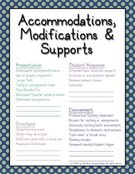Within the public school environment, when you begin to notice that your child is struggling and needs accommodations, you can request an Intervention and Referral Services Action Plan (I&RS). As you begin to have more data, you can request different plans, but let’s start with the I&RS Plan.
Intervention & Referral Services Action Plan
Based on the NJ Administrative Code (6A; 16-8.1; Establishment of Intervention and Referral Services) all school districts are required to have an I&RS committee available for students who are struggling with a learning, behavioral or health issue. The I&RS team is typically composed of the Principal, Guidance Counselor, teachers and the I&RS Coordinator. Other members, such as the Reading Specialist, Occupational/Physical or Speech therapist, and School Nurse can also be members.
An I&RS plan is developed and implemented within the school in order to provide accommodations and support to the student. This plan is created by the I&RS team in conjunction with the student’s parent(s). Accommodations are based on teacher observations and interventions already used. No testing is required.
The types of accommodations that can be a part of an I&RS plan range from preferential seating, extended time on assignments or tests, providing a bathroom or snack break, providing verbal and non-verbal cues to help re-focus, and providing study guides. This plan is reviewed every four to six weeks with the intent to remedy the situation and eliminate the plan.
Although this plan provides supports, the ultimate goal is to find solutions to the issue at hand. The belief is that the area of difficulty is short-term and by implementing a few strategies, it will be resolved.
The 504 Accommodation Plan
The 504 Accommodation Plan is guided by the American with Disabilities Act (ADA) to ensure that a student with a disability has access to accommodations to improve academic functioning, as the disability affects the student’s ability to access the general education curriculum, perform academically and make progress.
In order to qualify for a 504 Accommodation Plan, a student must have a diagnosis; however, a diagnosis does not ensure that your child will be granted a 504 Accommodation Plan. The diagnosis can include a physical or emotional disability, recovering from a chemical dependency, or impairment (e.g. Attention Deficit/Hyperactivity Disorder), a food allergy, a concussion that restricts one or more major life activity.
A document is created that specifies the disability as well as the accommodations needed by the student. Accommodations can consist of: moving a child’s seat, permitting a child to have frequent snacks or drink in the classroom due to a diagnosis (e.g., diabetes, etc), providing extended time on tests or assignments, modifying test questions, and/or providing statewide testing accommodations. Other accommodations include a personal aide to ensure safety around food allergies, or modifying the duration of a day for a child who has suffered a concussion.
Note that a student is not able to receive specialized instruction (e.g., In Class Resource program or Out of Class Resource Replacement) through a 504 Accommodation Plan.
The Individualized Education Plan (IEP)
An IEP is guided by the Individuals with Disabilities Education Act (IDEA) and is a plan and program that provides special education and related services to a student who is identified as having a disability that negatively impacts ability to receive academic instruction. A student who receives special education services is entitled to modification of curriculum, classroom accommodations, specialized instruction, and related services such as occupational therapy, physical therapy, speech therapy and/or counseling.
An IEP is a comprehensive and legal document that incorporates a student’s present levels of academic achievement and functional performance (PLAAFP) in which each teacher/therapist provides feedback about the student’s performance within the subject area and related service. Information from the PLAAFP guides the goals and objectives, which are specific identification of skills and areas that will be addressed through the IEP program. Goals and objectives are also ways of measuring growth within those areas over the course of the school year.
A child who is referred for special education and related services is tested by the Child Study Team. These evaluations can consist of the following: Psychological Evaluation, Educational Evaluation, Social Evaluation, Speech Evaluation, Physical Therapy Evaluation, Occupational Therapy Evaluation. Other evaluations, such as a Central Auditory Processing Evaluation, neurological exam, or psychiatric evaluation are often conducted by professionals outside of the school. Parents can request that the school cover the cost of these evaluations, or pay for them privately. Note that a parent can also gain an independent evaluation (Psychological, Educational) on a private basis, and submit these reports for the Child Study Team to review.
A student with an IEP is re-evaluated every three years to determine continued eligibility. However, a parent can request a re-evaluation sooner than three years, but not less than one year. An IEP is also reviewed annually; however, a parent can request a review of the child’s program as well as related services at any time.
I&RS vs. 504 vs. IEP
To clarify things a little better, an I&RS plan is what you can seek when your child needs formal accommodations, but does not have a documented disability (learning, behavioral or emotional).
You can request a 504 Accommodation Plan when your child has a diagnosed disability and requires classroom and statewide testing accommodations.
You can request a Child Study Team evaluation for a potential IEP when your child has a disability (learning, emotional, medical or behavioral) that requires the modification of curriculum and other special education programs, related services, and classroom and statewide testing accommodations.
I hope this has taken the mystery out of which plan is right for your child! If you still have questions, feel free to email me: drliz@psychedconsult.com.











